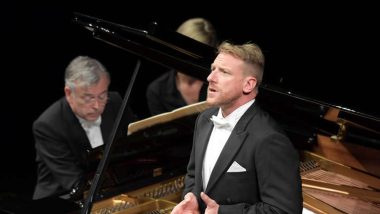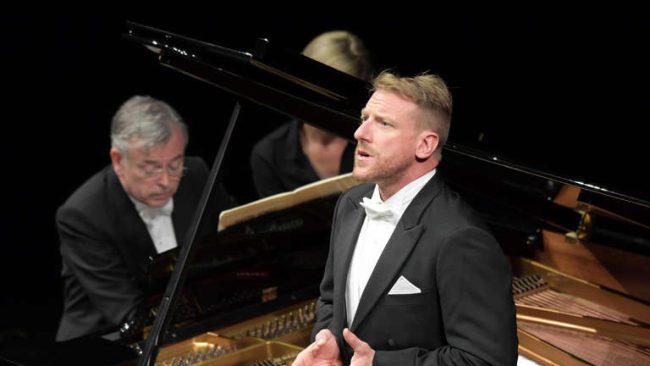 United Kingdom Various, A Man’s Love and Life: Günther Groissböck (bass) and Malcolm Martineau (piano). Wigmore Hall, London, 22.8.2023. (KMcD)
United Kingdom Various, A Man’s Love and Life: Günther Groissböck (bass) and Malcolm Martineau (piano). Wigmore Hall, London, 22.8.2023. (KMcD)

Beethoven – An die ferne Geliebte, Op.98
R. Schumann – Dichterliebe, Op.48
Brahms – Wie bist du, meine Königin, Op.32 No.9; Nicht mehr zu dir zu gehen, Op.32 No.2; Dein blaues Auge hält so still, Op.59 No.8; Die Mainacht, Op.43 No.2; Unbewegte laue Luft, Op.57 No.8; O wüsst ich doch den Weg zurück, Op.63 No.8
Tchaikovsky – Again, as before, alone, Op.73 No.6; None but the lonely heart, Op.6 No.6; Reconciliation, Op.25 No.1; Amid the din of the ball, Op.38 No.3; Don Juan’s Serenade, Op.38 No.1
Günther Groissböck makes a welcome return to the Wigmore Hall, for a distinguished evening of German Lied and Russian song. Given his hectic schedule at the Vienna State Opera, we were fortunate that the great Austrian bass scheduled a flying visit to London for what turned out to be another exceptional masterclass in the communicative power of song. Sandwiched between performances of Peneios (Daphne) and King Marke (Tristan und Isolde), he and his regular partner, Malcolm Martineau, delivered an evening of sublime music-making titled, A Man’s Love and Life. A judiciously-chosen selection of works chartered the feelings of love, longing, obsession and loss to perfection, with both singer and accompanist mining the emotional depths of each piece with pinpoint precision and an innate understanding of each shifting mood.
Beethoven’s An die ferne Geliebte, which opened the recital, stretches any singer’s interpretational skills to the limit, given they are required to portray a gamut of emotions over the course of the cycle’s six songs. Groissböck was at his most engaging here, exuding a sense of yearning at the start of Auf dem Hügel sitz ich, spähend (I sit on the hill gazing), his rich, dark bass lending an uncommon sense of gravitas to the vocal line. Honing down his voice to a barely audible whisper in Wo die Berge so blau (Where the blue mountains), drew the listener into his internalised world of torment, vividly capturing the sense of longing.
In the fifth song, Es kehret der Maien (May returns), a rare ray of light bursts through the clouds, which Groissböck captured to perfection, by brightening his tone, and infusing the opening words, ‘Es kehret der Maien, Es blühet die Au’ (‘May returns, the meadow blooms’) with a sense of joie de vivre that radiated optimism. As the song draws to its close a sense of melancholy returns, which Groissböck mirrored by whitening his tone, and making every word tell.
The air of melancholy which pervades Beethoven’s song cycle lingered in the air for Robert Schumann’s Dichterliebe, both Groissböck and Martineau delivering a mesmerising interpretation, that was not only impeccable from a musical standpoint, but was highly-charged emotionally as well. Groissböck gave notice of a singer at the peak of his interpretative powers, lending each song its own distinctive soundworld, from the hushed introspection of Aus meinen Tränen spriessen (From my tears will spring) via the fast, brilliantly-articulated Die Rose, die Lilie, die Taube, die Sonne (Rose, lily, dove) to the languid, gossamer-like tone in Wenn ich in deine Augen seh (When I look into your eyes).
It is testament to his artistry, and technique that he is able to sing so introspectively given he possesses such a huge voice. When let off the leash, for example in the highly declamatory Im Rhein, im heiligen Strome (In the Rhine, the holy river) or the climax of Ich grolle nicht (I bear no grudge), the effect is shattering, filling the Wigmore Hall with a torrent of sound, yet it never sounds forced.
Throughout the course of the ensuing songs he chartered the poet’s emotional journey to perfection. The final one, Die alten, bösen Lieder (The bad old songs) can surely have never felt more desolate than it did here, setting the seal on an extraordinary performance.
After the interval we were treated to a selection of songs by Brahms, where angst was replaced with optimism, which allowed Groissböck to show off his impeccable phrasing, warmth of tone and his ability to perfectly sustain a musical line. He brought a rare tenderness to Dein blaues Auge hält so still (Your blue eyes stay so still), rattled the rafters at the climax to Die Mainacht (May night), and brought out the sense of nostalgia in O wüsst ich doch den Weg zurück (Ah! If I knew the way back).
The evening concluded with a selection of songs by Tchaikovsky. Varying degrees of pessimism pervade each one – jolly they are not. Yet Groissböck made each one compelling, singing in idiomatic Russian – a language that fits his voice like a glove. Angst drips off every note of Again, as before, alone, which found Groissböck at his most mercurial – alert to every nuance within the song. He brought a sense of drama to Reconciliation, inflecting the text to perfection, and went on to throw caution to the wind with a no-holds barred, viscerally exciting Don Juan’s Serenade, where he held nothing back. To call his performance generous would be an understatement.
Throughout the evening, Martineau supported him with keenly-attentive playing, matching the drama Groissböck brought to the proceedings, note for note. This was yet again another superlative recital from this distinguished Austrian bass – thankfully now a regular fixture in the Wigmore Hall calendar.
Keith McDonnell
